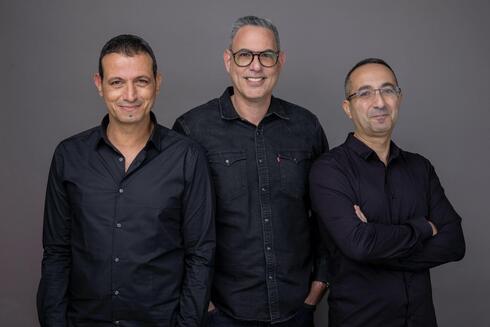
Most Promising Startups - 2025
Not just another Israeli startup story: Fetcherr’s AI engine could change markets
From early dropshipping to algorithmic trading, the founders are reinventing pricing at scale.
The story of Fetcherr stands out from most of the startups featured in this year's list of the 50 most promising companies. Its founders didn’t meet during military service or while working at the same tech company, as is often the case in Israel’s startup ecosystem—but rather on the way to kindergarten with their children.
See the full Top 50 Most Promising Startups 2025 list here
Today, those children are just about to be drafted into the army. Back in 2019, the three fathers launched a different kind of baby: a company developing AI-based forecasting tools for businesses. Roy Cohen, Dr. Uri Yerushalmi, and Robby Nissan used to have long conversations about artificial intelligence—before it entered the mainstream—while sitting in a playground in Netanya’s Poleg neighborhood. That’s still where the company is headquartered, despite having already raised $120 million and being more than capable of affording offices in Tel Aviv.
The trio also break the mold of conventional tech founders. Cohen, the CEO, was one of the first dropshippers in Israel and is considered an eCommerce expert. Yerushalmi, Fetcherr’s Chief AI Officer, is an algorithmic trading specialist who was among the first to earn a PhD in the field. Nissan, the company’s Chief Strategy Officer, is a marketing expert who previously held senior roles in both advertising and tech. What unites them, beyond parenthood, is their deep experience in building automated decision-making systems in complex markets.
Fetcherr began as a sort of intellectual experiment—an effort to challenge Amazon using advanced algorithmic strategies. The central question: can price changes be predicted in advance and dynamically optimized against demand? After a year of experimentation, the team concluded that the answer was yes. They formally incorporated the company just before the COVID-19 pandemic, with an ambitious vision. While OpenAI and others were building Large Language Models (LLMs), Fetcherr set its sights on building the first Large Market Model (LMM).
Related articles:
The company’s software ingests massive amounts of data, runs countless simulations, weighs them against demand curves, and generates optimal pricing forecasts. The model is agnostic to the industry—but the team chose to start with aviation, a sector that was heavily disrupted during the pandemic. Their thinking: if they could modernize decision-making in one of the largest, most antiquated markets in the world, breaking into others would be easier.
Validation came during Delta Airlines’ investor day in late 2024, when a significant portion of the presentation was dedicated to a small company from Netanya. Delta’s president referred to Fetcherr’s technology as the airline’s new “super analyst,” capable of dynamically pricing flights without human involvement. The system, he explained, allows Delta to instantly simulate complex scenarios—for example, the impact of a $40 fare increase on a specific route on a specific date—and assess whether passengers would still book with Delta or defect to a competitor.
Currently, only a small percentage of Delta’s pricing decisions are handled by Fetcherr’s engine, but the airline plans to scale up. The goal of highlighting the system to investors was to demonstrate how it could help improve Delta’s long-term profitability. Another airline already using Fetcherr claims the predictive engine has increased its revenue by several percentage points.
The interest hasn’t stopped there. Since the Delta presentation, multiple global carriers have approached Fetcherr, and the company is now looking at entirely new markets—from gaming to finance.
Company ID
Sector: AI for Business
Established: 2018
Founders: Roy Cohen, Dr. Uri Yerushalmi, Robby Nissan
Employees: 170, 100 in Israel and the rest in the US and Poland
Funding: $116 million from Battery Ventures, Lanet, Livermore, M-fund, Left Lane
